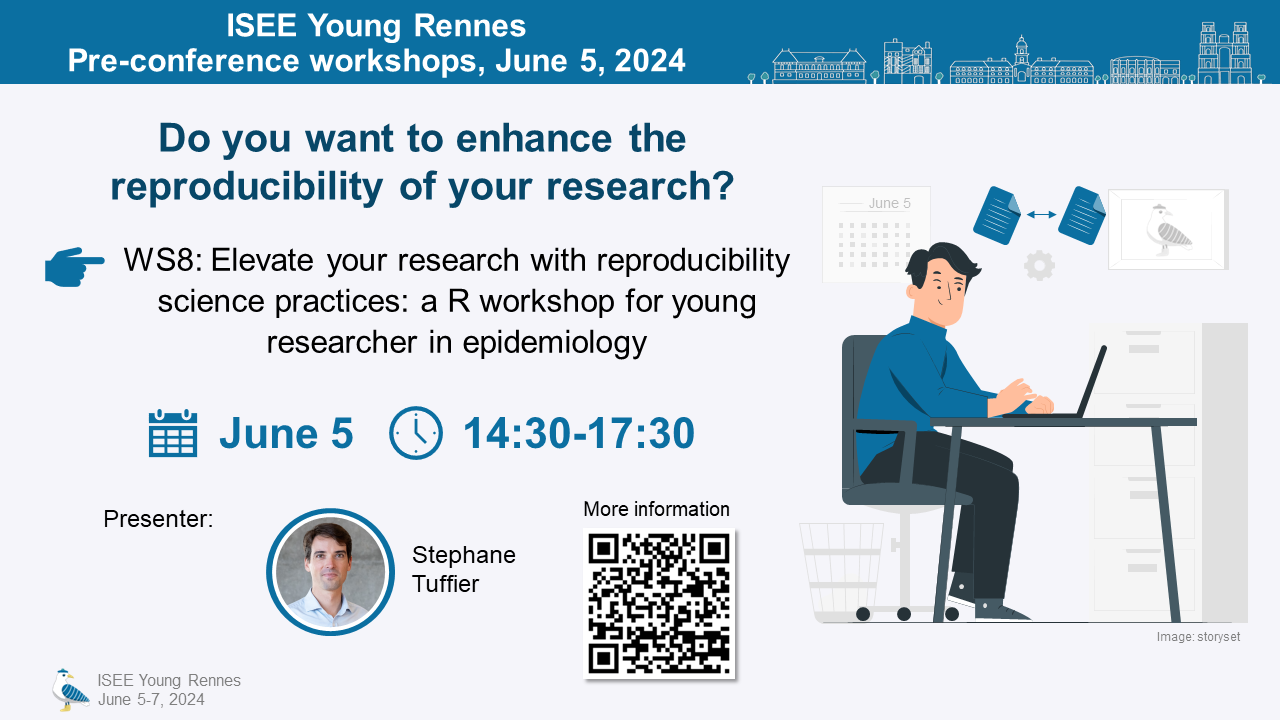Elevate your research with reproducibility science practices: a R workshop for young researcher in epidemiology
This workshop aims to provide young epidemiology researchers knowledge and skills to increase reproducibility of their research.
The first part of the workshop will begin by defining reproducibility and its importance in epidemiology, exploring associated challenges and opportunities. In the second part of the workshop, focus will be put on practical solutions and their application so that young researchers can implement in their analysis and writing.

Goals
Explain what is a reproducibile analysis workflow
Show how to improve the organisation of your R projects
Show and apply simple tools to make your analysis code cleaner, shorter, documented and more reproducible
Introduce to Git to track changes in your code
Program
Introduction (20 minutes):
- Welcome
- Importance of reproducibility in epidemiology research
- The principles of a reproducible workflow
- Creating and organizing a project structure for reproducibility
- Avoiding copy pasting with functions
- Git basic to keep track your code
Hands-on Activity 1: a simple reproducible project (40 minutes)
- How to organize project’s files
- Style R scripts
- First Git commit
- Introduction to creating your own functions
Break (30 minutes)
Hands-on Activity 2: create a nice report (50 minutes)
- Functional programming wiht
purrr - Create a nice report with quarto
- Make nice tables using
gt - Bonus: Git branch and remote repo
- Functional programming wiht
Closing Remarks and Q&A (15 minutes)
- Summary of key takeaways
- Resources for further learning
- Open floor for questions and discussion
Requirements
Computer with the following software installed:
- R (version R 4.3.0 or later)
- R-studio, version 2023.03 or later (other IDE like Visual code can also be used)
- quarto (version 1.3 or later)
- git and git-gui (version >= 2.40.0)
All the pre-workshop instructions can be found here: Pre-workshop.
References
This workshop was created and heavily inspired by many amazing ressources from the R community. Here is the list of references and books that were usefull to create this workshop.
Books:
- R for Data Science (2e) by Hadley Wickham, Mine Çetinkaya-Rundel, and Garrett Grolemund. https://r4ds.hadley.nz/
- Advanced R by Hadley Wickham. https://adv-r.hadley.nz/index.html
- Intro Reproducible Research in R, An introductory workshop on modern data analyses and workflows by Luke W. Johnston, Helene Baek Juel, Bettina Lengger, Daniel R. Witte, Hannah Chatwin, Malene Revsbech Christiansen, Anders Aasted Isaksen. https://doi.org/10.21105/jose.00122, https://r-cubed-intro.rostools.org/
- Intermediate and Advanced Reproducible Research in R by Luke W. Johnston. https://r-cubed-intermediate.rostools.org/, https://r-cubed-advanced.rostools.org/
- The carpentries. https://carpentries.org/
- What They Forgot to Teach You About R by Jennifer Bryan, Jim Hester, Shannon Pileggi, E. David Aja. https://rstats.wtf/
- Happy Git and GitHub for the useR by Jennyfer Bryan. https://happygitwithr.com/
Packages:
- tidyverse: https://www.tidyverse.org/
- quarto: https://quarto.org/
- gt: https://gt.rstudio.com/
- here: https://here.r-lib.org/
- broom: https://broom.tidymodels.org/
Git:
- Pro Git book by Scott Chacon. https://git-scm.com/book/en/v2
- https://ohmygit.org/
- https://learngitbranching.js.org
Dataset:
- National Health and Nutrition Examination Survey (NHANES) from the CDC. https://www.cdc.gov/nchs/nhanes/index.htm
Re-use and licensing

The course material is licensed under the Creative Commons Attribution 4.0 International License, so the material can be used, re-used, and modified, as long as there is attribution to this source.
Issues and comments
In case you encounter any error or strugle with the workshop material, you can report an issue in the left side menu. Feel free to contact me by email too.